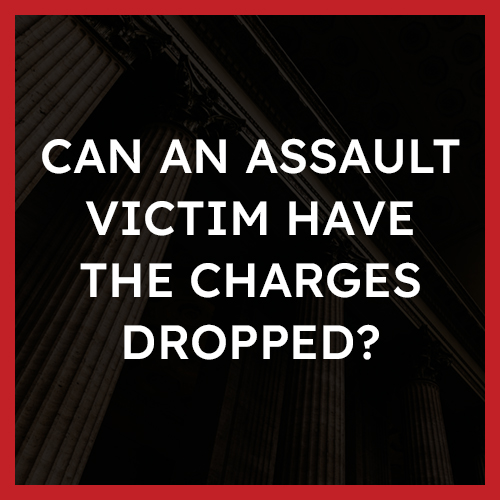What is assault?
A person commits assault when he or she, directly or indirectly, intentionally or recklessly applies force to a person, or threatens to apply force to a person without that person’s consent. A person also commits assault when he or she spits on another person, or if he or she accosts or impedes another person or begs while carrying a weapon or an imitation of a weapon.
While assault is considered a violent offence, it is not necessary for any physical injury to result from the assault for you to be charged with this offence. In fact, the threat of force and a present ability to carry out that threat are enough for a charge of assault to be laid. That is, if you make a threatening gesture, whether with your body or with a weapon, and you are in such a position that you could actually carry out the threat, you can be convicted of assault.
In Canadian criminal law there are several different types of assault, including simple assault (the type of assault we will deal with in this section), domestic assault, aggravated assault, assault with a weapon, and assault causing bodily harm. Of these offences, simple assault is the least serious and typically involves minor instances of violence that do not result in significant, or any, bodily injury.
In order to secure a conviction for simple assault, the Crown Prosecutor must prove the following elements beyond a reasonable doubt:
- How the assault occurred. Depending on the nature of the charge, the Crown Prosecutor may need to prove the application of force, that there was a threat of force, that the accused had the present ability to carry out that threat, or that the accused caused the other person to believe on reasonable grounds that the accused had the ability to carry out that threat;
- That the force or threat of force was applied intentionally;
- That the victim did not consent to the assault; and,
- Injuries, if any are alleged to have been sustained by the victim.
If the Crown Prosecutor fails to establish any of these elements beyond a reasonable doubt, the accused will be entitled to an acquittal or a finding of not guilty.
Assault of a Police Officer:
One type of assault that deserves special mention is the assault of a police officer. If you assault a police officer in the execution of his or her duty, you will likely be charged with assault of a peace officer, a very serious offence in the Criminal Code. A “peace officer” includes a wide range of people beyond just regular police officers or RCMP officers. For example, mayors, wardens, officers in the military, and even pilots, are all peace officers.
Assault of a peace officer is treated more seriously than other types of assault so that our state can better ensure that law and order is preserved in Canada. That is, by treating assaults against police officers more seriously than assaults against civilians, the authorities can ensure that offenders are further deterred from acting violently against those that uphold the law. As such, if you are charged with assaulting a peace officer, you can expect that you will automatically be facing a harsher penalty than if you had simply assaulted a civilian.
In order to prove that you are guilty of assaulting a peace officer, the Crown will need to prove the same elements required for simple assault. However, they will also have to demonstrate that the police officer was acting in the lawful course of duty when the assault happened.
The Penalty for Committing Assault in Canada:
Assault is a hybrid offence which means that the Crown Prosecutor can choose to proceed either by indictment or by summary conviction. If the Crown Prosecutor proceeds by indictment, you can face up to 5 years of imprisonment in the event of a conviction. If the Crown proceeds summarily, the maximum time you can spend in prison is 6 months.
The severity of your penalty will depend largely on the circumstances of the offence, and will be heavily influenced by the presence of aggravating or mitigating factors. Aggravating factors are factors that increase the moral culpability of your offence and can lead to the judge imposing a harsher penalty in the event of conviction. In the context of an assault, it will be considered aggravating if you assaulted a peace officer, or someone defenceless like a young child, an elderly person, or a person with a disability. It will also be considered aggravating you have a prior criminal record for similar offences, or if you committed the assault while out on bail or probation for another offence.
Mitigating factors are things that reduce the moral culpability of the offence and that may lead to you receiving a lesser penalty for your assault. For example, mitigating factors can include things like the fact that this was your first offence, that it was an isolated incident and you have a low risk of re-offending, or that you may have done community service or counselling after the incident in order to rehabilitate yourself.
Depending on the nature and severity of the offence, as part of your sentence you can also be subject to a firearms and weapons prohibition. This is an ancillary order that will preclude you from owning or possessing a firearm or a weapon for a period of time specified by the court. Further, you can also expect that after being convicted you will likely be prohibited from contacting or going near the victim of the assault.
About The Author
Ask A Question
We endeavor to respond to questions within 24 hours. If your matter is urgent, please call our office or submit a request for a free consultation.






